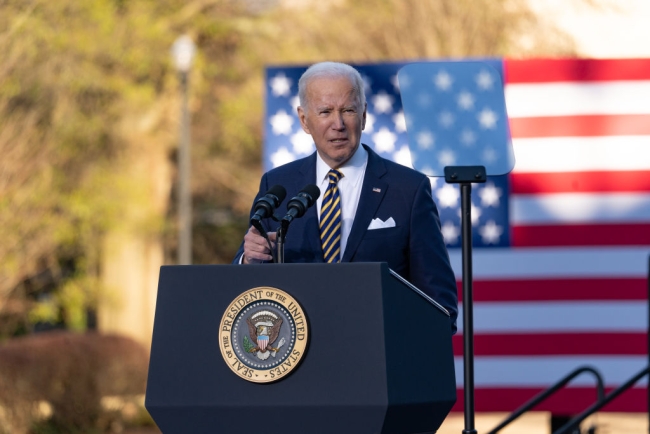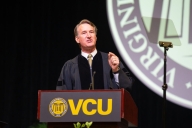You have /5 articles left.
Sign up for a free account or log in.

President Joe Biden speaking at the Atlanta University Center Consortium, a group of historically Black colleges and universities, which includes Morehouse College, in 2022.
Megan Varner/Stringer/Getty Images News
Morehouse College leaders made a celebratory announcement last week that President Biden would be this year’s commencement speaker. But the news was met with anything but celebration by some students, faculty members and alumni of the historically Black men’s college in Atlanta, who condemn Biden’s support for Israel.
An activist group called Faculty and Staff for Justice in Palestine - Georgia issued a statement the next day urging Morehouse to rescind Biden’s invitation to speak in May. The group warned that hosting Biden would alienate donors and prospective students and prompt protests related to the ongoing violence in Gaza.
“As faculty members at academic institutions in and around Atlanta—including Morehouse, Spelman, and Clark Atlanta—we did not see this coming,” the statement read. “This is not the Morehouse College that history has known and that we have come to treasure … President Biden has not demonstrated sensitivity to wrongs, sufferings and injustices. And as the one person on the planet who has the power to stop an active genocide, he has not accepted responsibility for correcting the ills.”
Some alumni released a similar letter calling on members of the campus community to “make your dissent known.”
“Like any group of alumni of any college or university, political and ethical commitments among us are not unanimous,” the letter read. “There are many among us, however, who stand on the prophetic vision of our most famous alumnus”—Martin Luther King, Jr.—“who said in 1967 that war is a hell that diminishes us all as human beings, and that our moral conscience compels us to speak out against it.”
Students also aired their concerns at a town hall administrators held last Tuesday, the day the announcement was made. In a video clip of the meeting shared on X by Capital B Atlanta, Morehouse president David A. Thomas stressed to students that Biden’s visit reflected the “stature and importance” of the institution. He said the administration would not “reverse course” on Biden’s invitation, which was issued before the Israel-Gaza war broke out.
Biden will be the second sitting president to give a commencement speech at Morehouse, after former President Barack Obama in 2013.
“Not many schools in the country have a chance to host a sitting president for one commencement, let alone now we’ll have two,” Kendrick Brown, provost and senior vice president of academic affairs at Morehouse, told Inside Higher Ed.
He’s not surprised the announcement about Biden’s visit sparked debate on campus.
“We expect them to have strong opinions,” he said of students and professors. “We want those strong opinions to come into contact with each other. That’s the whole point of college, is to enable folks to encounter perspectives that might differ from their own.”
In a press briefing last Wednesday, White House Press Secretary Karine Jean-Pierre responded to the blowback over Biden’s upcoming commencement speech.
Commencements are “about celebrating accomplishments," said Jean-Pierre. “And the President is certainly looking forward to doing that … I understand this is a different moment in time that we’re in. But he always takes this moment as a special time to deliver a message—an encouraging message, a message that’s hopefully uplifting to the graduates and their families.”
“And we’re going to continue to have these conversations … with the different communities about what’s happening right now,” she added. “We get it. It’s painful. We get that. We understand that.”
Implications for 2024
Objections to Biden’s impending visit come amid a frenetic election cycle. The Biden administration has made repeated outreach efforts to young Black voters, including a February ad focused on his funding of HBCUs and visits to HBCU campuses.
And polling shows such voters need courting. Only 44 percent of Black young people say they’re “extremely likely” to vote, compared to 57 percent of young voters overall, according to a poll from the Center for Information and Research on Civic Learning and Engagement at Tufts University. About half of those “extremely likely“ voters prefer a Democrat, but 31 percent of youth polled overall say they’re undecided. Meanwhile, a November 2023 poll by GenForward, a University of Chicago project that surveys young adults of color, found that young Black voters are more likely than their white peers to sympathize with Palestinians and believe the U.S. offers too much support to Israel.
Calvin Bell, a senior at Morehouse who voted for Biden in 2020, said he recognizes that having the president come speak is “major” for an HBCU, institutions historically “overlooked” and “underfunded,” but he hopes the college considers rescinding Biden’s invitation. Bell supports a ceasefire in Gaza and also worries that hosting a high-profile speaker during an election year, with all the enhanced security that requires, could be a “distraction” from the accomplishments of the graduating class, who persevered through the pandemic as freshmen.
But if Biden does speak, what the president says could affect his vote, Bell said.
“We’re an institution of young Black men, hoping to take on the world through service and utilizing our intellect to make change for others,” he said. He doesn’t want to hear a campaign speech touting Biden’s record of support for HBCUs; he’d prefer “a very candid address” in which Biden addresses the backlash to his stance on the Israel-Gaza war, particularly after signing an almost $1 billion aid package to Israel, Ukraine and Taiwan last week.
Bell also hopes Biden shares the kinds of insights typically delivered in a commencement speech about “what we as young Black men can do as we walk into the next stage of our lives,” he said.
Whatever happens, “I would just say this is not going to be a dull moment.”
Stephane Dunn, an English professor and chair of the cinema, television and emerging media department, noted that speaking at Morehouse could bode well for Biden.
It gives the president an “incredible opportunity to speak specifically to concerns, to acknowledge them, to also basically make his case as any candidate needs to do in a very critical year where there is concern about how will young folk, how will college-age students turn out to the polls,” she said.
Dunn isn’t against Biden coming to speak, despite her own concerns about the Israel-Gaza war, but said she supports her colleagues and students expressing dissent.
“Part of community is to accept that we always have lively debate and divergence of opinions …” she said. “It’s less division than it is, to me, what an intellectual community, which has a social-activist background and concern in its mission, is supposed to do. I would be a little bit worried if there was sort of placid agreement.”
In a similar vein, she’s glad to see students demonstrate political activism, she said, praising Morehouse administrators for responding with forums for dialogue at a time when other campuses have met protests with “fear.”
Morehouse’s debate over Biden’s commencement address is happening against the backdrop of widespread, ongoing pro-Palestinian protests on campuses across the country. University leaders and police have escalated crackdowns on some campuses, including nearby Emory University, Columbia University, Emerson College and others.
Brown said he expects students and faculty to continue robust debate about Biden’s visit and his policies related to Israel in the lead-up to graduation. They might even express their opinions on the Israel-Gaza war at the ceremony as well, but he “has a lot of confidence” they’ll do so in ways that don’t disrupt the event “which is really about the students,” he said.
“We respect the range of opinions that our students, our faculty and our staff have, just as much as we trust them to understand the importance of the occasion,” he said. A president coming to visit already means enhanced security, but otherwise, “I don't see us needing to necessarily do anything more than our community already does to ensure that the range of viewpoints on an issue can be heard and can be expressed safely and peacefully amongst all of us in our community.”








